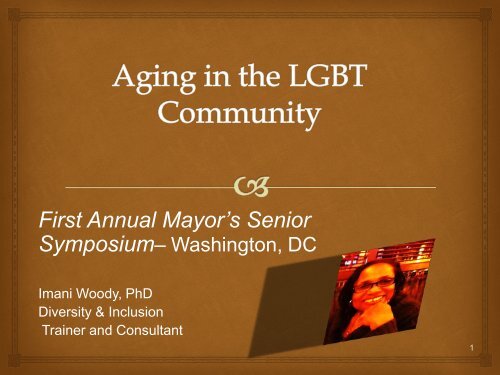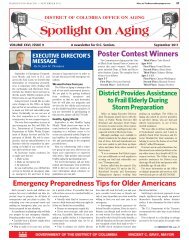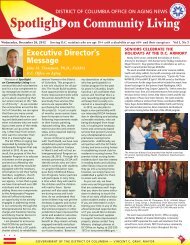First Annual Mayor’s Senior Symposium–
Aging in the LGBT Community - dcoa
Aging in the LGBT Community - dcoa
Create successful ePaper yourself
Turn your PDF publications into a flip-book with our unique Google optimized e-Paper software.
<strong>First</strong> <strong>Annual</strong> <strong>Mayor’s</strong> <strong>Senior</strong><br />
<strong>Symposium–</strong> Washington, DC<br />
Imani Woody, PhD<br />
Diversity & Inclusion<br />
Trainer and Consultant<br />
1
Who Are You?<br />
<br />
Your Name,<br />
Date of Birth<br />
2
The Way Things Were<br />
<br />
Could be arrested, fired<br />
or hospitalized<br />
Countless put in mental<br />
institutions<br />
In 1973 the AMA<br />
removed<br />
homosexuality as a<br />
mental disorder<br />
Sex-realignment<br />
surgery unavailable<br />
Many married and had<br />
children to fit in<br />
3
The data show that LGBT elders age<br />
with fewer supports<br />
<br />
80% of LGBT elders age without a partner vs.<br />
40% of overall older adult population (10)<br />
90% of LGBT elders don’t have children vs.<br />
20% of overall older adult population (10)<br />
4
General Experiences of LGBT<br />
<br />
Sense of Being Different<br />
Aversion to Labels<br />
Elders<br />
Deliberate Concealment of Sexual Identity and<br />
Orientation<br />
Fear of Rejection and Loss from Biological Family<br />
Sense of Grief and Loss related to aging and its<br />
effects on the quality of one’s live<br />
Levels of Intolerance and Coping Strategies<br />
5
Impacts on Health<br />
<br />
Health disparities based on access to health care<br />
Higher rate of stress related to systematic<br />
discrimination. Experience Minority Stress on at least<br />
2 fronts, ageism, and sexual orientation/sexual<br />
identity<br />
Isolation<br />
Substance Abuse<br />
Suicide<br />
6
Just the Facts<br />
<br />
3 million LGBT elders<br />
in the United States<br />
Lesbian and Gay Older<br />
Adults more likely to<br />
be childless and living<br />
alone<br />
LGBT elders have<br />
survived by scanning<br />
for clues<br />
By ignoring or avoiding<br />
LGBT issues, service<br />
providers contribute to<br />
isolation<br />
7
8
Recommendations<br />
Aging community and social services should create<br />
environments that are visibly welcoming and<br />
inclusive and programs that specifically address the<br />
needs of lesbian and gay African American elders.<br />
Invest in diversity and inclusion training<br />
Produce materials that celebrate the lives of older,<br />
lesbian and gay African Americans<br />
Dismantle institutional levels of ageism, heterosexism,<br />
classism, through staffing and policy.<br />
9
Thank You!<br />
<br />
Dr. Imani Woody<br />
IWF Consulting, LLC<br />
drimani2011@gmail.com
References<br />
<br />
Adelman, M., Alcedo, M., Brinkin, L., Flaxman, N., Kirkpatrick,<br />
W., et.al. (2009). From Isolation to Inclusion: Reaching an Serving<br />
Lesbian, Gay, Bisexual and Transgender (LGBT) seniors.<br />
Burrelli, D., & Feder, J. (2009). Homosexuals and the U.S. military:<br />
Current issues. Washington, DC: Congressional Research<br />
Service (CRS). Retrieved February 6, 2010, from<br />
http://www.fas.org/sgp/crs/natsec/RL30113.pdf<br />
Cahill, S., South, K., & Spade, J. (2006). Outing age: Public policy<br />
issues affecting gay, lesbian, bisexual and transgender elders.<br />
Policy Institute National Gay and Lesbian Task Force.<br />
Kertzner, R., Meyer, I., Frost, D., & Stirratt, M. (2009). Social and<br />
psychological well-being in lesbian women, gay men and<br />
bisexuals: The effects of race, gender and sexual identity.<br />
American Journal of Orthopsychiatry, 79(4), 500-510.
References<br />
<br />
Meisner, B., & Hynie, M. (2009). Ageism with heterosexism: Selfperceptions,<br />
identity and psychological health in older gay and<br />
lesbian adults. Gay and Lesbian Issues and Psychology Review,<br />
5(1), 51-59.<br />
Miller, R. J. (2007). Legacy denied: African American gay men and<br />
the Black church. Social Work, 52(1), 51-62.<br />
Moradi, B., Wiseman, M., DeBlaere, C., Goodman, M., et al. (2010).<br />
LGB of color and White individuals’ perception of heterosexist<br />
stigma, internalized homophobia and outness: Comparison of<br />
levels and links. The Counseling Psychologist, 38(3), 397-424.<br />
Myer, I. (2010). Identity, stress and resilience in lesbian women,<br />
gay men and bisexuals of color. The Counseling Psychologist,<br />
38(3), 442-454.<br />
National Center for Lesbian Rights (NCLR). (2009). Planning with<br />
a purpose: Legal basics for LGBT elders. San Francisco, CA.
References<br />
<br />
O’Hanlan, K. (n.d.). Lesbian health and homophobia: Perspectives<br />
for treating obstetrician/gynecologist. Retrieved February 19,<br />
2010, from<br />
http://www.blackwomenshealthproject.org/leshealth.htm<br />
Pope, M., Wierzalis, E., & Rankin,M. (2007). Sexual intimacy issues<br />
for aging gay men. Adults Journal, 6(2), 68-82.<br />
Szymanski, D., & Gupta, A. (2009). Examining the relationship<br />
between multiple internalized oppressions and African<br />
American, lesbian, gay, bisexual and questioning persons’ selfesteem<br />
and psychological distress. Journal of Counseling<br />
Psychology, 56(1), 110-118.<br />
Wilson, B. & Miller, R. (2002). Strategies for managing<br />
heterosexism used among African American gay and bisexual<br />
men. Journal of Black Psychology, 28(4), 371-391.




